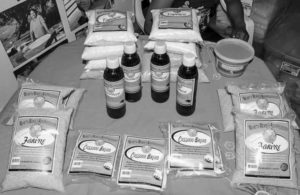The Wowetta Women’s Agro-Processors story is one of trial and error, determination and innovation. When the group was first set up in 2008 as a voluntary enterprise by a group of women set on generating income for their families, few knew it could grow to provide employment far beyond the Region Nine community.
The village, which border the Iwokrama International Rainforest Protected area, is now the site of a modern, multimillion-dollar cassava processing and farine storage facility, where up to 10,000 pounds of farine can be stored, thanks to a collaborative effort of CIDA, CI, CUSO and other stakeholders. And the facility provides paid employment for about 30 women, youths and elderly persons and cassava farmers across the Rupununi.
Grace Albert, the manager of the agricultural initiative, which is run by a committee, explained that the group’s members rotate, five to seven at a time, to produce farine, sweet cassava flour, cassava bread, cassareep and tapioca on a weekly basis from about 3000 pounds of cassava that is grown to their specification. “We work with our farmers (also from neighbouring villages) from before planting to ensure we get a good product so that we can assure our customers of quality.”
That is just the beginning of the quality assurance process as the group has worked with the Food and Drug Department to ensure that what they put on supermarket shelves is of international quality.
She noted that while finding markets remain a problem, miners were their best customers, particularly for farine, dubbed “Rupununi Gold” by some.
Albert stressed that sustainability of the venture was a big part of their operations, because the group’s mission continues to be creating income-generating employment for women in particular in Wowetta, although they have expanded their focus also to youths.
When asked what advice she would give to persons hoping to get up similar operations, she said commitment and dedication were very important.
“It takes a lot of human effort, it takes a lot of commitment,” another member, Priscilla, said. She was adamant that would-be agro-processors would have to be” very serious…have ownership of the group”. She noted that “it really needs people on the ground” to understand the long-term benefits, to motivate and inspire others, to show them how their children can benefit, to make sure they have the interest.
Albert also pointed out that record-keeping was important, as she highlighted that the group began on a voluntary basis, on their own without any capital, so they had quite a few challenges. She added that the Wowetta Women’s Agro-Processors would be willing to act as mentors and help others, as they were quite willing to share their knowledge.
Contact: 628-9201; c/o IICA Guyana, Lot 18 Brickdam, Stabroek, Georgetown; Tel: 226-8835
Thursday, November 7, 2024
Recent posts
- APNU/AFC, GECOM expose Guyana to sanctions – PPP
- President Trump urges FDA to consider Chloroquine to treat COVID-19
- US sends strong warning to persons involved in electoral fraud in Guyana
- Coalition cracks – JFAP calls on Granger to “do the right thing”
- Linden man knifes woman and lover to death in jealous rage



